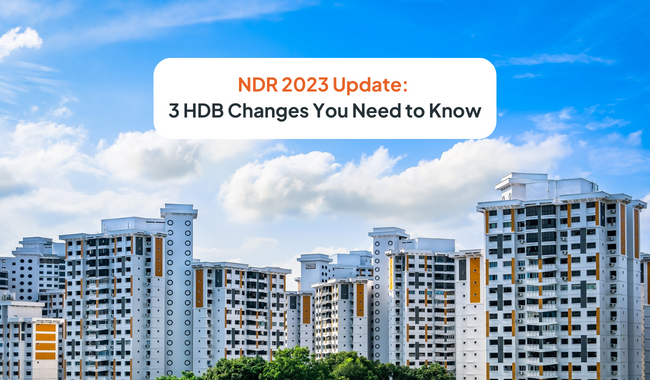A renovation loan can be a godsend for newlyweds who have put most of their savings into their wedding and new marital home, or for homeowners who already have most of their funds tied up in home loans.
It can ease up your cash flow while also helping you achieve your home renovation goals, regardless if it’s motivated by aesthetic reasons or more practical needs, like making a home more conducive for child-rearing or work-from-home arrangements.
To help you decide which renovation loan package to pick, we’ve compiled all the important factors you need to know and consider.
Renovation Loan Essentials
1. Eligibility criteria for renovation loans
Age and income eligibility requirements differ from bank to bank but in general, all applicants have to be Singapore Citizens or Permanent Residents, aged 21 to 65 years old.
You have to either be the property owner or a family member (parent, spouse, child or sibling) who has the owner’s consent.
Applicants must also be employed, with a minimum income of S$24,000 per annum (p.a.).
Check out the table below for a clearer idea of your loan eligibility with the various banks:
| Age | Single Applicant | Joint Applicants | |
| DBS/POSB | 21 to 50 years | Min. income of $24,000 p.a. | Main applicant needs a min. income of $24,000 p.a., while joint applicant needs a min. income of $12,000 p.a. |
| CIMB | 21 to 50 years | Min. income of $24,000 p.a. | Min. income of $24,000 p.a. |
| MAYBANK | 21 to 55 years | Min. income of $30,000 p.a. | Combined min. income of $30,000 p.a. with main applicant earning a min. of $24,000 |
| OCBC | 21 to 59 years | Min. income of $24,000 p.a. | At least one applicant needs a min. income of $24,000 p.a. |
| RHB | 21 to 55 years | Min. income of $30,000 p.a. | Both applicants need a min. income of $30,000 |
2. Quantum and tenure
The banks in Singapore typically loan you up to $30,000 or six times your monthly salary, whichever is lower. Different banks have different loan minimum sums, with DBS/POSB, Maybank and OCBC set at $5,000 while CIMB and RHB have minimum sums of S$10,000.
Loan tenures typically run up to a maximum of 5 years.
Tip: Most banks will offer a more favourable interest rate if you have an existing home loan, or take up one with them.
3. Renovation loan interest rates
There is a common misconception that renovation loans have very demanding interest rates. But they’re actually lower, and more effective, than personal loans.
The interest rates for home renovation loans can range from 3-4%, while a personal loan can be around 6-9% p.a.
Take note that the interest can be calculated in 2 ways:
Your renovation loan can be calculated on a flat rate, which is when the interest is based on the entire principal amount. This can be more expensive than a monthly rest rate, when the interest is charged only on the outstanding amount.
When you see a renovation loan promotion from a bank, consider it carefully before taking up a package. There may be a reduced interest rate, a waiver for the processing fee, or other incentives that can make it seem like the best choice, but it is always best to do a proper calculation and planning to find a comfortable monthly repayment plan for your desired loan quantum, within an acceptable tenure.
4. Other fees to pay
Another thing to consider is the fees that come with getting a renovation loan. The standard fees can include the following:
| Type of Fee | Charge Amount |
| Processing/ Handling Fee | 1% of the approved loan amount |
| Insurance Premium | 1% of the approved loan amount |
| Admin Fee/ Issuance of Cashier’s Order | Varies per bank. With POSB/ DBS, the first cashier’s order is free and for the subsequent ones, a $5 fee will be chargeable. For CIMB and OCBC, the first 3 cashier orders are waived. |
| Prepayment Fee | 1-2% on the amount prepaid |
| Cancellation Fee | 1-2% of the approved loan amount |
| Late payment Fee | Varies per bank. With POSB/ DBS, the late payment fee is $35 for each month (or part of it) that the instalment or interest is not paid. The late payment fee is $80 for both CIMB and OCBC. |
5. Renovation loan usage
What your renovation loan can be used for:
Home renovation loans typically cover the following:
- Electrical and wiring works
- Installation of solar panels
- Built-in cabinets and carpentry
- Painting and wallpapering
- Hacking and structural alterations
- Flooring and tiling works
- Sanitary fittings
- External works within the house compound
The loan can be used for renovation in all types of residential housing including BTO, HDB, condominium and landed homes.
What your renovation loan cannot be used for:
A home renovation loan does not cover furniture or appliance purchases. So no, it’s not going to cover air conditioning or that built-in oven from Bosch and fancy designer sofa you’ve been eyeing.
Some banks like RHB do offer a separate furnishing loan if you need financial help with your furniture purchase.
In summary
Having a clear idea of your renovation budget is a good start to making sure you do not take up a renovation loan amount that will take a heavy toll on your finances. Your ability to comfortably repay monthly instalments is a key indicator of whether your repayment plan works for your lifestyle. It is also a good idea to check out any promotions the banks may be offering for the best interest rates.
It is also crucial to note that in the event your interior designer or contractor is unable to complete the job or fulfil your renovation works, or if the renovation company shuts down, you are still liable for the amount you borrowed. Thus, we highly recommend you work out a staggered payment process with your bank to split your loan amounts such that payment is made only after satisfactory completion of certain milestones. It is never a good idea to pay for the full amount of incomplete services upfront.



































































